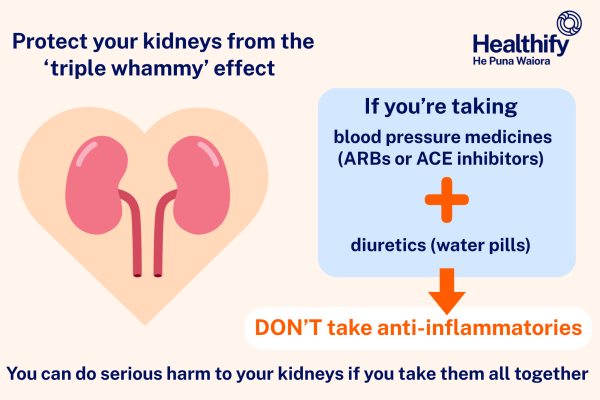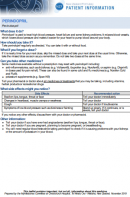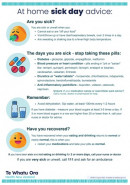You can now add Healthify as a preferred source on Google. Click here to see us when you search Google.
Perindopril
Sounds like 'per-in-doe-pril'
Key points about perindopril
- Perindopril is used to treat high blood pressure and heart failure and to prevent kidney problems for people with diabetes.
- Perindopril is also called Coversyl.
- Find out how to take it safely and possible side effects.

Perindopril has many different effects on your body so it is used to treat a range of conditions. It belongs to a group of medicines called ACE inhibitors.
Perindopril may be used for the following conditions:
- High blood pressure – by relaxing and widening your blood vessels it lowers your blood pressure.
- Heart failure – to help your heart pump blood more easily. This can help to relieve symptoms such as shortness of breath and swelling in your feet, legs and abdomen (tummy).
- Diabetic kidney disease (diabetic nephropathy) – to protect your kidneys and help them to function.
- After a heart attack (myocardial infarction) to protect your heart, once you are stable.
Perindopril can work quickly for hypertension (high blood pressure). If you have heart failure it may be a few weeks before you notice an improvement in your symptoms.
In Aotearoa New Zealand perindopril is available as tablets (2 mg, 4 mg and 8 mg).
- Always take perindopril exactly as your prescriber has told you. The pharmacy label on your medicine will tell you how much to take, how often to take it and any special instructions.
- The dose of perindopril will be different for different people depending on your condition.
- Your prescriber will usually start you on a low dose so it doesn't make you feel dizzy. Your dose will be increased slowly over a few weeks depending on how you respond. This allows your body to get used to the medicine and reduces side effects.
- Check with your pharmacist if your tablets are different to what you expect.
- Timing: Perindopril is usually taken once a day, in the morning. Take your dose at about the same time each day. Your healthcare provider may suggest that you take your first dose before bedtime because it can make you feel dizzy.
- Limit or avoid alcohol while you are taking perindopril. Alcohol can increase your chance of side effects such as dizziness and light-headedness.
- Missed dose: If you forget to take your dose, take it as soon as you remember. But if it is nearly time for your next dose, just take the next dose at the right time. Don't take double the dose.
If you are pregnant or planning a pregnancy
ACE inhibitors can affect your baby's kidneys, especially if it's taken in the second and third trimesters of pregnancy. This can result in long term damage to your baby's kidneys.
If you're already pregnant, talk to your doctor straight away. Usually your doctor will be able to prescribe a different medicine that's safe to take in pregnancy. ACE inhibitors should be stopped by the time you're 12 weeks pregnant at the latest.
Use contraception if you're taking ACE inhibitors and carefully plan any pregnancy with your GP, pregnancy specialist (obstetrician) or hospital doctor. They will want to review your medical condition and medicine before you get pregnant.
Most women stop taking ACE inhibitors before getting pregnant, but some may continue until they have a positive pregnancy test and then stop. Your doctor will discuss what's best for you, based on your medical condition and the risks and benefits of ACE inhibitors.
Severe allergic reaction to an ACE inhibitor
You shouldn't take ACE inhibitors if you've had a severe allergic reaction to an ACE inhibitor in the past, eg, swelling of your face, lips, mouth or tongue (called angioedema). Angioedema is a rare but potentially serious side effect and it can be fatal. It can occur at any time, including in people who have been taking ACE inhibitors for years. Read more about angioedema from ACE inhibitors in the side effects section below.
Here are some things to know when you're taking perindopril. Other things may be important as well, so ask your healthcare provider what you should know about.
Monitoring
Your doctor will arrange for you to have blood tests and blood pressure checks before you start taking perindopril and during your treatment, especially when you first start taking it. This is to check how it is working and to check your kidneys and potassium levels.
Have a sick day plan
If you have diarrhoea (runny poo) or are vomiting (being sick) from a stomach bug, or are dehydrated from another illness, it’s important to let your healthcare provider know. They may advise that you decrease your dose or stop taking your perindopril for a few days, and start again when you feel better.
Be careful when taking some pain relief medicines
ACE inhibitors can be used to protect your kidneys from damage if you have diabetes. However, if you are taking perindopril and diuretics (water pills), the combination of these with NSAIDs (anti-inflammatory pain relief medicines) can be very harmful to your kidneys. It can cause acute kidney injury. This combination is called the ‘dangerous trio’ or ‘triple whammy’. You have a higher risk of harm to your kidneys if you are also an older adult (over 65 years) or you're dehydrated.
If you are taking an ACE inhibitor with a diuretic, do not use NSAIDs for pain relief. Talk to your healthcare provider about safe pain-relief options for you. Read more about NSAIDs and protecting your kidneys.
- Examples of NSAIDs are ibuprofen (Nurofen, Brufen SR), Diclofenac (Voltaren), Naproxen (Noflam, Naprosyn), Mefenamic acid (Ponstan), Celecoxib (Celebrex) and Tenoxicam (Tilcotil).
- Examples of diuretics are furosemide, bumetanide, bendroflumethiazide, chlortalidone, hydrochlorothiazide, indapamide, spironolactone, eplerenone and metolazone.

Image credit: Healthify He Puna Waiora
Read more about the triple whammy effect.
Are you pregnant or planning a pregnancy?
Tell your healthcare provider if you become pregnant or are planning a pregnancy while you're taking perindopril.
Like all medicines perindopril can cause side effects, although not everyone gets them. If you're concerned about any symptoms you think might be related to your medicine, talk to your healthcare provider. The following information offers some guidance but doesn't include all possible side effects.
Common side effects
Tell your healthcare provider if these side effects bother you.
- Headache.
- Upset tummy or feeling sick, constipation or diarrhoea.
- Tickle in your throat, or dry, irritating cough.
- Dizziness, feeling lightheaded or faint when you stand up. This is quite common when you first start taking perindopril and usually goes way with time. Be careful when getting up from either lying down or sitting to avoid falls. These effects put you at risk of falls and injuries, especially if you're an older adult. Stand up slowly. If you do feel dizzy, sit or lie down for a few moments.
Tell your healthcare provider immediately or phone Healthline free on 0800 611 116 if these occur
- Signs of problems with your liver, such as yellowing of your skin or eyes, dark pee (urine) or pain in your abdomen (tummy).
Phone 111 for an ambulance or go to your nearest accident and emergency (A&E) clinic if these occur
- Signs of an allergic reaction such as itchy skin, and rash, swollen lips or tongue, problems breathing, like a tight chest or shortness of breath.
Read more about medicines and side effects and reporting a reaction you think might be a side effect.
The following links provide more information on perindopril.
Perindopril(external link) NZ Formulary Patient Information
References
- Perindopril(external link) NZ Formulary
Brochures

Perindopril
NZ Formulary

At home sick day advice
Health New Zealand | Te Whatu Ora, 2023

Medicines and side effects
Healthify He Puna Waiora, NZ, 2024
Credits: Sandra Ponen, Pharmacist, Healthify He Puna Waiora. Healthify is brought to you by Health Navigator Charitable Trust.
Reviewed by: Angela Lambie, Pharmacist, Auckland
Last reviewed:





